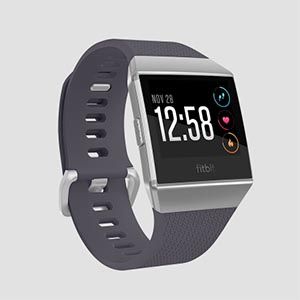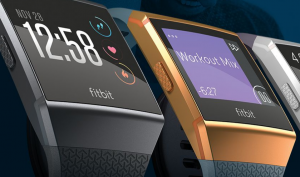
In its strongest bid yet to challenge the category-dominating Apple Watch, Fitbit debuted its first-ever smartwatch, the Fitbit Ionic, on its website Monday.
The long-awaited smartwatch, which is currently available for preorder at $299.95, runs on a brand new operating system, Fitbit OS, and promises to be the easy-to-use, health-boosting buddy active consumers have been clamoring for.
The ultra-thin watch is decidedly sporty-feeling, but is also, unfortunately, wholly nondescript looking. Where the Apple Watch boasts graceful, softly sloping lines, the Ionic’s design recalls that of a generic, drugstore sport watch.
It’s a missed opportunity. Though users can dress up the Ionic with a leather strap, there’s definitely room for loads more design in this device.
So far there are three color ways: a blue-gray band with a silver bezel, a slate blue band with a rust-colored bezel, and a charcoal band with a dark silver bezel (all were inspired by sci-fi movies, a Fitbit representative told Wareable).

Top and above: The new Fitbit Ionic smartwatch
Of course, it’s stuffed with functions—more than most people could probably use with any regularity. This is Fitbit, after all.
The Ionic boasts the brand’s basic metrics: step counter, heart rate, and sleep monitor, among other sensors. It also supports third-party apps (a relative rarity in smartwatches) and comes preloaded with payment system Fitbit Pay, which uses NFC technology to make contactless payments at retail locations.
The watch’s battery life is four days, which is on the long side for a fully featured wearable. And its 1,000-nit display is sharp as a tack, reports Wareable writer Hugh Langley, who’s been test-driving an Ionic for a week now.
The company claims the watch’s GPS capabilities trump any of its older efforts on this front and that its new heart rate sensor is more accurate than past iterations.
The smartwatch also marks the debut of Fitbit Coach, a program of workouts that offers real-time feedback. Users can choose from basic workout options for free or pay for more comprehensive fitness curricula.
Will it all be enough to take on the Apple Watch, which reportedly moved 6 million units in the fourth quarter of 2016 alone?
I can see an avalanche of fitness-loving consumers gravitating to the Ionic, for its in-device coaching, its thin-and-lightweight profile, and (slightly lower) pricing. But the Apple Watch is a proven entity—and Apple has had years to tweak and perfect its wearable, making it difficult for any manufacturer to catch up.
If nothing else, it will be an interesting matchup to monitor.
- Subscribe to the JCK News Daily
- Subscribe to the JCK Special Report
- Follow JCK on Instagram: @jckmagazine
- Follow JCK on X: @jckmagazine
- Follow JCK on Facebook: @jckmagazine